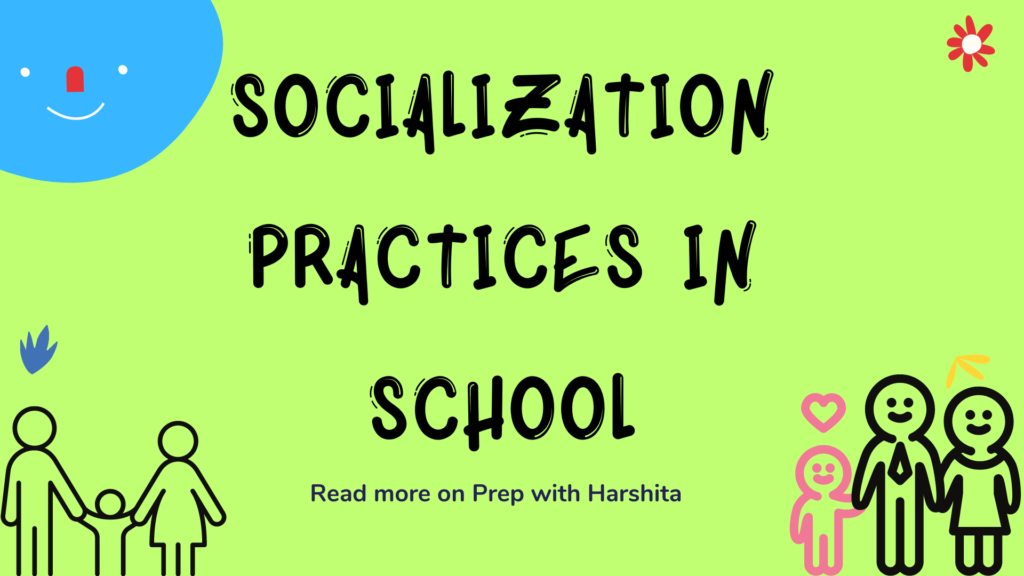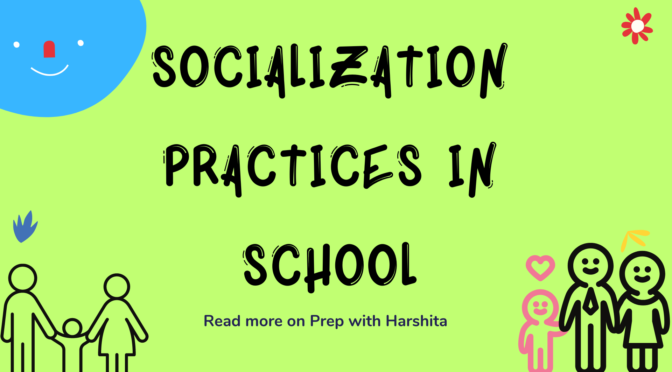The socialization practices in schools refers to the ways in which students learn and internalize societal norms, values, behaviors, and social roles through their experiences and interactions within the school environment.
Here is a detailed explanation of the socialization process in schools:
- Primary Socialization: Schools are one of the primary agents of socialization, alongside families. They provide a structured and formalized setting where children begin to acquire the knowledge, skills, and social norms necessary for their development and integration into society. Schools build on the foundation of early socialization received within families and extend it to a broader social context.
- Academic and Cognitive Socialization: The primary focus of schools is academic learning and intellectual development. Students are socialized into a culture of learning, acquiring knowledge, critical thinking skills, problem-solving abilities, and other cognitive skills. They learn the academic subjects, curriculum, and educational standards set by the school and educational authorities.
- Social Norms and Behaviors: Schools play a crucial role in teaching and reinforcing social norms, behaviors, and expectations. Students learn appropriate behavior, manners, and social interactions through rules, discipline, and peer influence. They learn to follow instructions, respect authority figures (teachers, administrators), and adhere to the established codes of conduct within the school environment.
- Peer Socialization: Peer interactions and relationships significantly contribute to socialization in schools. Students learn from their peers through observation, imitation, and social comparison. They engage in collaborative learning, teamwork, and group projects, which help develop social skills, empathy, cooperation, and understanding of diverse perspectives.
- Teacher-Student Interactions: The relationships between teachers and students are essential in the socialization process. Teachers serve as role models and guides, influencing students’ behavior, attitudes, and values. Positive teacher-student interactions promote trust, respect, and support, fostering a positive learning environment and social-emotional development.
- Hidden Curriculum: Alongside formal academic curriculum, schools also transmit implicit messages through what is known as the “hidden curriculum.” This refers to the unwritten rules, values, and beliefs that are indirectly taught in the school environment. Examples include the importance of punctuality, obedience, competition, conformity, and gender roles. The hidden curriculum can shape students’ perspectives and socialization beyond explicit classroom teachings.
- Extracurricular Activities: Participation in extracurricular activities, such as sports teams, clubs, arts programs, or student organizations, contributes to socialization in schools. These activities provide opportunities for students to explore their interests, develop skills, collaborate with peers, and learn values like teamwork, leadership, and time management.
- Cultural and Diversity Socialization: Schools often serve as melting pots of diverse cultures, backgrounds, and perspectives. Through multicultural education, schools can promote awareness, appreciation, and understanding of different cultures, fostering tolerance, respect, and social inclusion.
- Moral and Ethical Socialization: Schools play a role in instilling moral values and ethical behavior. Through character education, discussions on ethical dilemmas, and teaching social responsibility, schools help students develop a sense of right and wrong, empathy, integrity, and a moral compass to navigate ethical challenges in their lives.
It is important to note that the socialization process in schools can vary depending on factors such as cultural context, educational philosophy, school policies, and the individual experiences of students. Schools should strive to create inclusive and supportive environments that promote positive socialization, respect diversity, and empower students to become active and responsible members of society.
Also Read : Relation between School and Society

Also Visit : Prep with Harshita


Howdy! I could have sworn I’ve been to this site before but after checking through some of the post I realized it’s new to me. Anyways, I’m definitely delighted I found it and I’ll be bookmarking and checking back often!
Dead pent written content, Really enjoyed looking through.